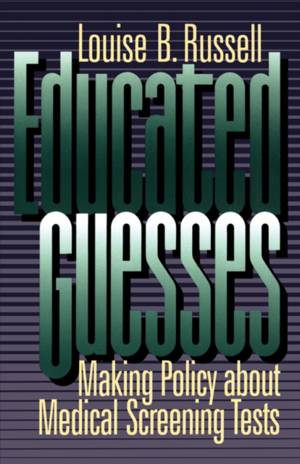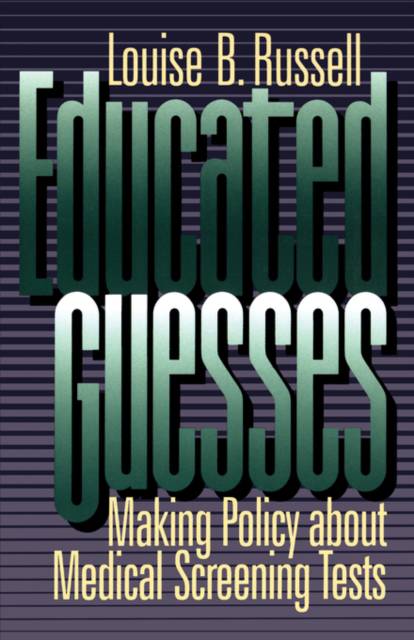
- Afhalen na 1 uur in een winkel met voorraad
- Gratis thuislevering in België vanaf € 30
- Ruim aanbod met 7 miljoen producten
- Afhalen na 1 uur in een winkel met voorraad
- Gratis thuislevering in België vanaf € 30
- Ruim aanbod met 7 miljoen producten
Zoeken
€ 45,95
+ 91 punten
Omschrijving
A copublication with the Milbank Memorial Fund
Prevention is the best cure-or is it? As medical experts hammer home the importance of annual medical checkups and routine screening for everything from high blood pressure to cancer, Americans have come to believe that frequent screening tests are essential for saving lives. But just how effective are the tests that we have come to take for granted? In this provocative book, medical economist Louise Russell challenges the standard wisdom that more is necessarily better by examining three routinely administered tests-those designed to detect cervical cancer, prostate cancer, and high levels of cholesterol.
Standard recommendations such as annual Pap smears for women and prostate tests for men over forty are in fact simply rules of thumb that ignore the complexities of individual cases and the tradeoffs between escalating costs and early detection, Russell argues. By looking beyond these recommendations to examine conflicting evidence about the effectiveness of screening tests, Russell demonstrates that medical experts' recommendations are often far simpler and more solid-looking than the evidence behind them. It is not at all clear, for example, that annual Pap smears are effective enough in reducing deaths from cervical cancer to justify the enormous additional costs involved in testing all women every year rather than every three years. Nor is there solid evidence for the value of prostate cancer screening, despite recommendations that all men over forty be tested annually.
The three case studies presented here, each important in its own right, raise serious questions about how tests are evaluated, recommendations formed, and medical resources allocated. At a time when American health care policies and the escalating costs of health care are the object of renewed scrutiny, Russell's challenge to conventional wisdom is especially important. Based on a detailed analysis of the available medical research, yet written in a straightforward, jargon-free style, Educated Guesses will be required reading for all those concerned about making informed choices about health care policies and their personal health.
Prevention is the best cure-or is it? As medical experts hammer home the importance of annual medical checkups and routine screening for everything from high blood pressure to cancer, Americans have come to believe that frequent screening tests are essential for saving lives. But just how effective are the tests that we have come to take for granted? In this provocative book, medical economist Louise Russell challenges the standard wisdom that more is necessarily better by examining three routinely administered tests-those designed to detect cervical cancer, prostate cancer, and high levels of cholesterol.
Standard recommendations such as annual Pap smears for women and prostate tests for men over forty are in fact simply rules of thumb that ignore the complexities of individual cases and the tradeoffs between escalating costs and early detection, Russell argues. By looking beyond these recommendations to examine conflicting evidence about the effectiveness of screening tests, Russell demonstrates that medical experts' recommendations are often far simpler and more solid-looking than the evidence behind them. It is not at all clear, for example, that annual Pap smears are effective enough in reducing deaths from cervical cancer to justify the enormous additional costs involved in testing all women every year rather than every three years. Nor is there solid evidence for the value of prostate cancer screening, despite recommendations that all men over forty be tested annually.
The three case studies presented here, each important in its own right, raise serious questions about how tests are evaluated, recommendations formed, and medical resources allocated. At a time when American health care policies and the escalating costs of health care are the object of renewed scrutiny, Russell's challenge to conventional wisdom is especially important. Based on a detailed analysis of the available medical research, yet written in a straightforward, jargon-free style, Educated Guesses will be required reading for all those concerned about making informed choices about health care policies and their personal health.
Specificaties
Betrokkenen
- Auteur(s):
- Uitgeverij:
Inhoud
- Aantal bladzijden:
- 148
- Taal:
- Engels
Eigenschappen
- Productcode (EAN):
- 9780520083660
- Verschijningsdatum:
- 11/02/1994
- Uitvoering:
- Paperback
- Formaat:
- Trade paperback (VS)
- Afmetingen:
- 139 mm x 209 mm
- Gewicht:
- 172 g

Alleen bij Standaard Boekhandel
+ 91 punten op je klantenkaart van Standaard Boekhandel
Beoordelingen
We publiceren alleen reviews die voldoen aan de voorwaarden voor reviews. Bekijk onze voorwaarden voor reviews.











